





October 2023, on the B 300 between Ebershausen and Kettershausen in the Lower Allgäu region. In accordance with a tender issued by the Krumbach State Building Authority, 1,425 tons of warm mix asphalt (WMA) are to be paved on one section. The area to be reconstructed here is approximately 5,400 square metres and passes through picturesque scenery. No comparable large test track is to be found anywhere else in Bavaria. Everything is going according to plan. And that’s how it should continue in the future.
Xaver Lutzenberger GmbH & Co. KG has been commissioned with the asphalt construction. The company from Pfaffenhausen received support from the regional BOMAG customer service team to ensure successful implementation – with BOMAG expertise to draw on, there won’t be any issues paving the warm mix asphalt (WMA).
From the 2025 construction season onwards, warm mix asphalt will be the norm. The use of WMA and the resulting lower paving temperature means that working conditions on construction sites can be made considerably more pleasant.
In its autumn meeting in 2019, the Committee on Hazardous Substances (AGS) had already adopted an occupational exposure limit (OEL) of 1.5 mg/m³ for vapour and aerosol during the hot processing of bitumen. However, a transitional period was approved for the affected sectors.

In recent years, manufacturers of bitumen and asphalt have developed products and techniques that can significantly reduce the production temperature and, as a result, the paving temperature of mastic and rolled asphalt.
Viscosity-altering organic additives (e.g. wax) or mineral additives (e.g. zeolite) now enable processing temperatures that are 20 to 40 °C lower than with conventional hot asphalt.
However, the application possibilities and properties of warm mix asphalt are comparable to those of hot asphalt, including quality, service life and recyclability of the material. The use of additives has been monitored with testing by the Federal Highway Research Institute (BASt) for many years.

Especially noteworthy here is the reduction of exposure for the paving crew and saving energy, thus lowering CO2 emissions during manufacture.
Lowering the temperature during production can save up to 9 kWh of energy per ton - a factor that significantly reduces the energy requirements of the mixing plant, resulting in tangible cost savings.
In addition, the document describes how a temperature decrease of just 10 °C halves the emissions caused by vapours and aerosols from the bitumen.
What’s more, thanks to the lower mix temperature, the road can usually be reopened to traffic sooner. This can be a crucial advantage when paving in very narrow time frames, for example, on important roads, motorways and airports.

The site management team used ASPHALT PRO to optimise the interlinking of the process flows and ensure that paving was carried out with as few interruptions as possible. The software from BOMAG considerably simplifies the planning effort for upcoming road construction projects and enables real-time monitoring of the paving process.
ASPHALT PRO shows how much material has already been paved, the remaining mix required, the quantity of paving material currently on the road and when the next load will arrive. Masses are displayed and calculated in real time. Every deviation, delay or change can be documented in ASPHALT PRO, keeping site managers and the mixing plant informed of the changes.
ASPHALT PRO sets the pace for mix production and calculates the scheduling of lorries based on the fastest route from the mixing plants to the construction site. The software documents delays and disruptions in the process, providing a solid foundation for optimisations and adjustments.
During production, the temperature of the paving material was reduced from 180 °C to 140 °C with the help of an additive. The distance from the mixing plant in Günzburg to the construction site is 37 kilometres, resulting in an additional temperature loss of approximately 2 to 3 °C. Daniel Lauer, Site Manager, Xaver Lutzenberger GmbH & Co. KG
At the same time, ASPHALT PRO enables continuous quality documentation: even the data or measuring values recorded during surface covering dynamic compaction control (CCC), e.g. with BOMAP, can be easily integrated; in particular, the number of compaction passes, measured temperature and EVIB value.
crucial not only when paving warm mix asphalt but also for a continuous material flow, which is essential for high-quality road construction. On the B 300 federal road between Ebershausen and Kettershausen, a BOMAG BF 2500 S asphalt feeder ensured an uninterrupted and controlled supply of mix to the paver. A total of 40 tonnes of paving material could be buffered in front of the screed in this way.
If at all possible, there should be no physical or thermal demixing of the material. When using a BOMAG feeder with FLEXMIX technology, the paving material remains particularly homogeneous. The auger and belt technology used with FLEXMIX corrects cold spots before the material is paved.
The material mixing with FLEXMIX takes place in two steps. Step 1: by two conical augers in the material hopper. Step 2: with a central flow divider and mixing unit at the end of the belt, which together ensure ideal material mixing before transfer to the paver.
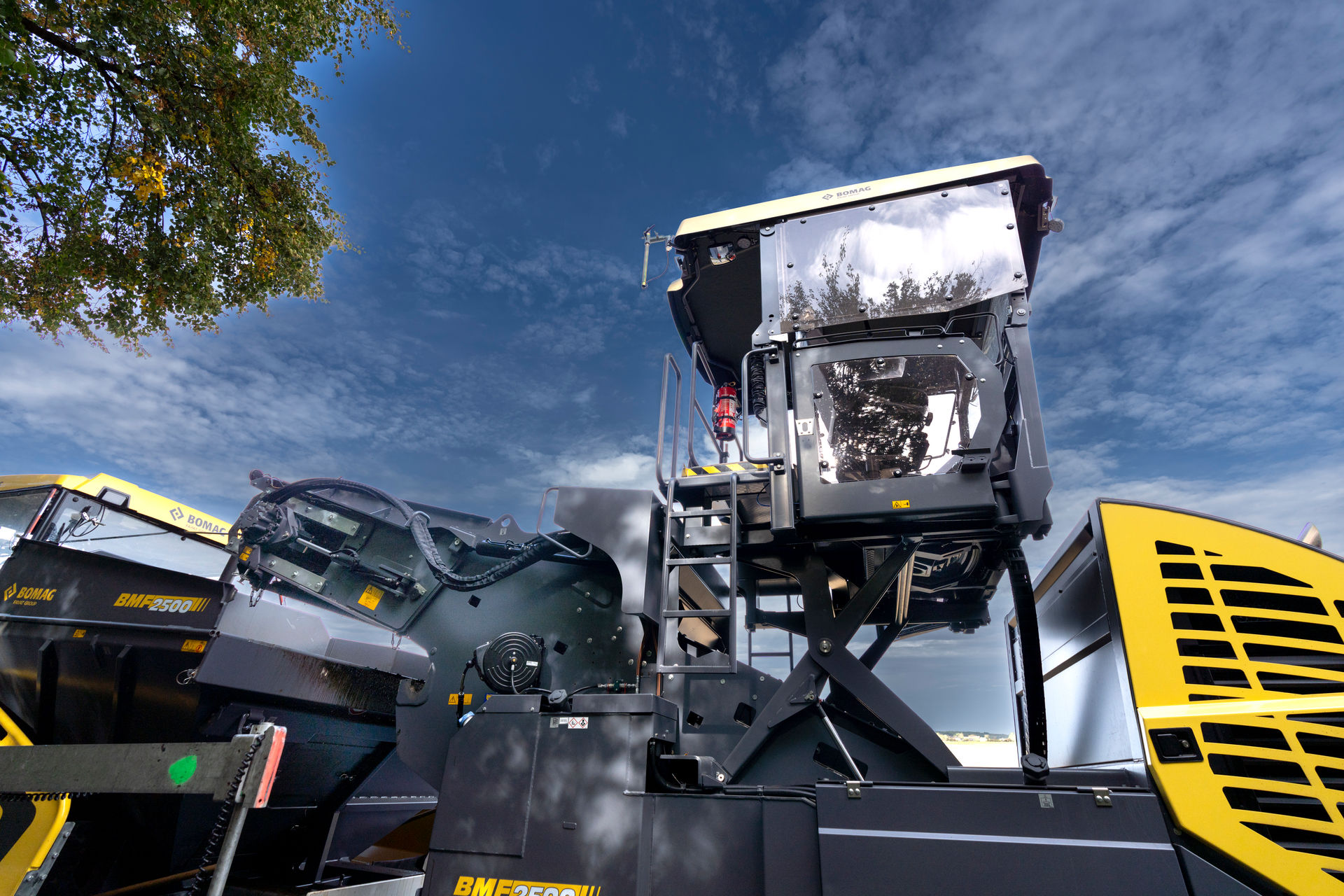
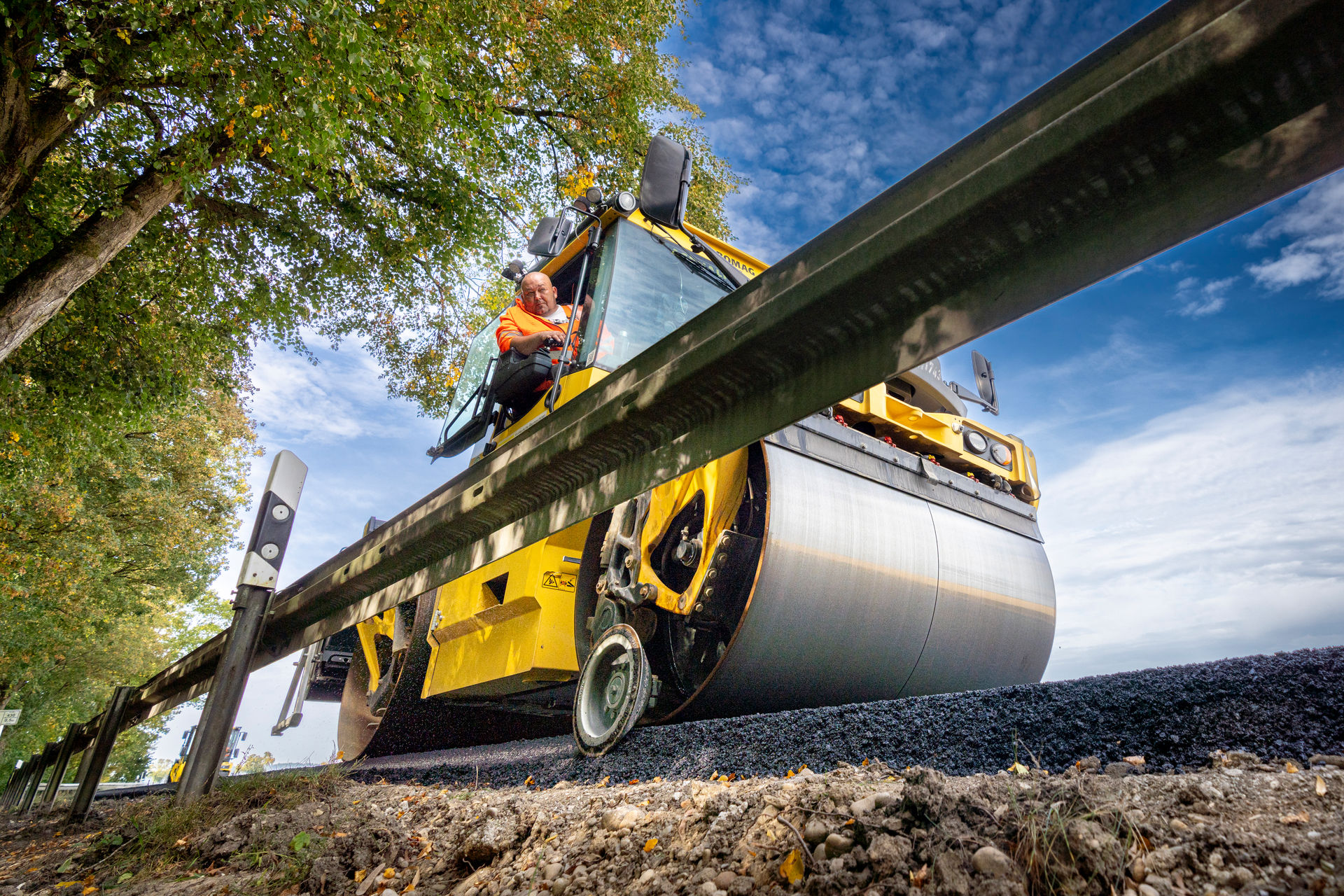
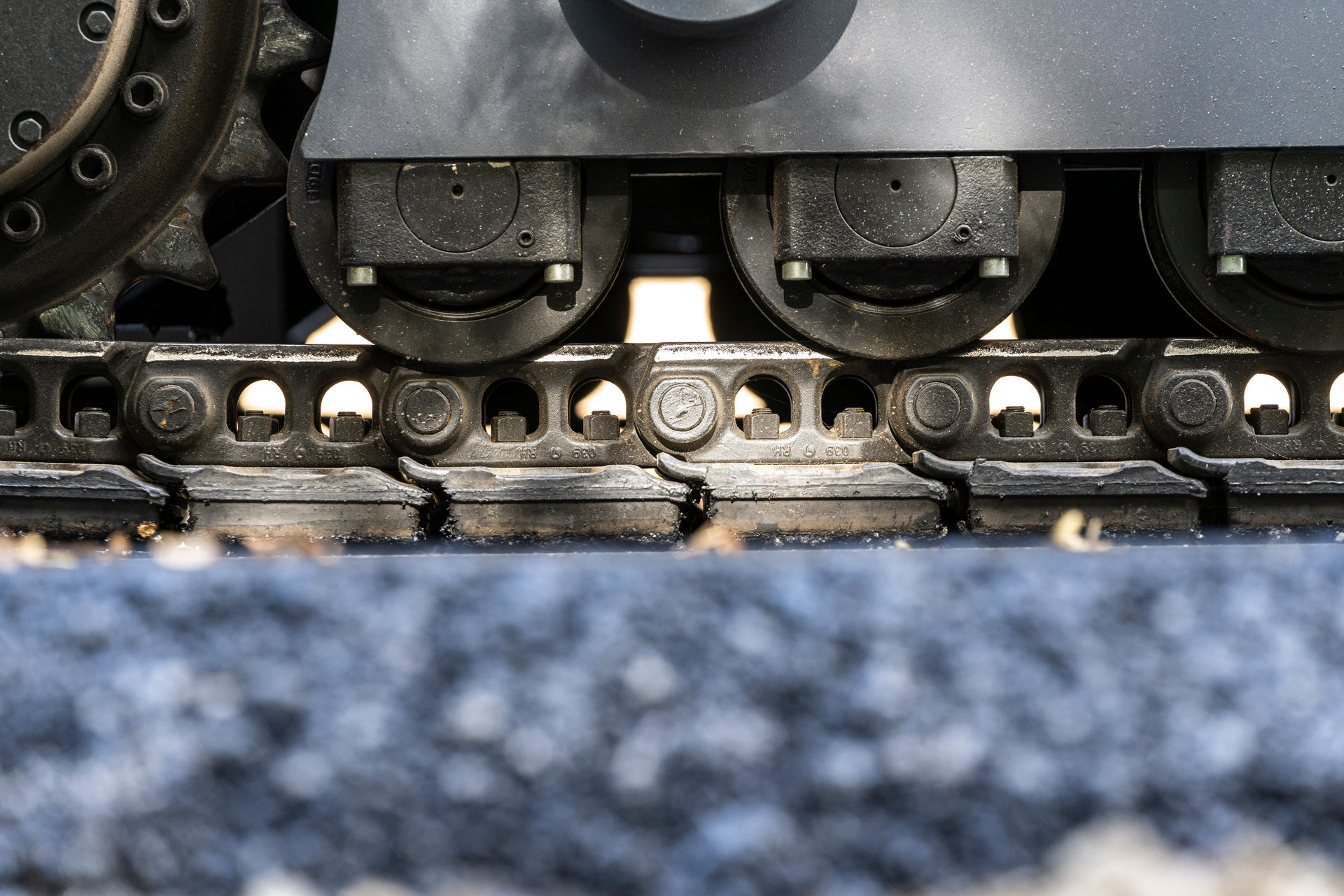
The BOMAG BF 700 asphalt paver used in Lower Allgäu was equipped with the optional extraction system and – like all BOMAG pavers – with a specially designed high-performance screed.
The vibration frequency of the screed plates and tampers on the BOMAG screed are perfectly matched. Additionally, the BOMAG screed boasts a very high dead weight, allowing for excellent pre-compaction values - because one thing is clear: the better the pre-compaction, the faster and more efficient the entire paving process can proceed.
The use of 400 mm long screed plates from the outset resulted in a perfect asphalt surface.
A BOMAG screed stands out due to its almost perfect constant floating behaviour – even under varying paving conditions. Moreover, thanks to the aluminium-cast heating rods and the resulting even heat distribution, material adhesion and surface roughening can be reduced to an absolute minimum.
The consistent temperature of the paved material remains a decisive factor in quality road construction. With PAVE IR and the precise measurement and display of the values on a display in the paver, any sudden thermal demixing of the paving material can be detected immediately. Armed with this information, roller operators can choose the best moment for compaction.
PAVE IR also enabled the storage of measured temperature values, ensuring clean documentation of the project in this process step – as required in the tender.
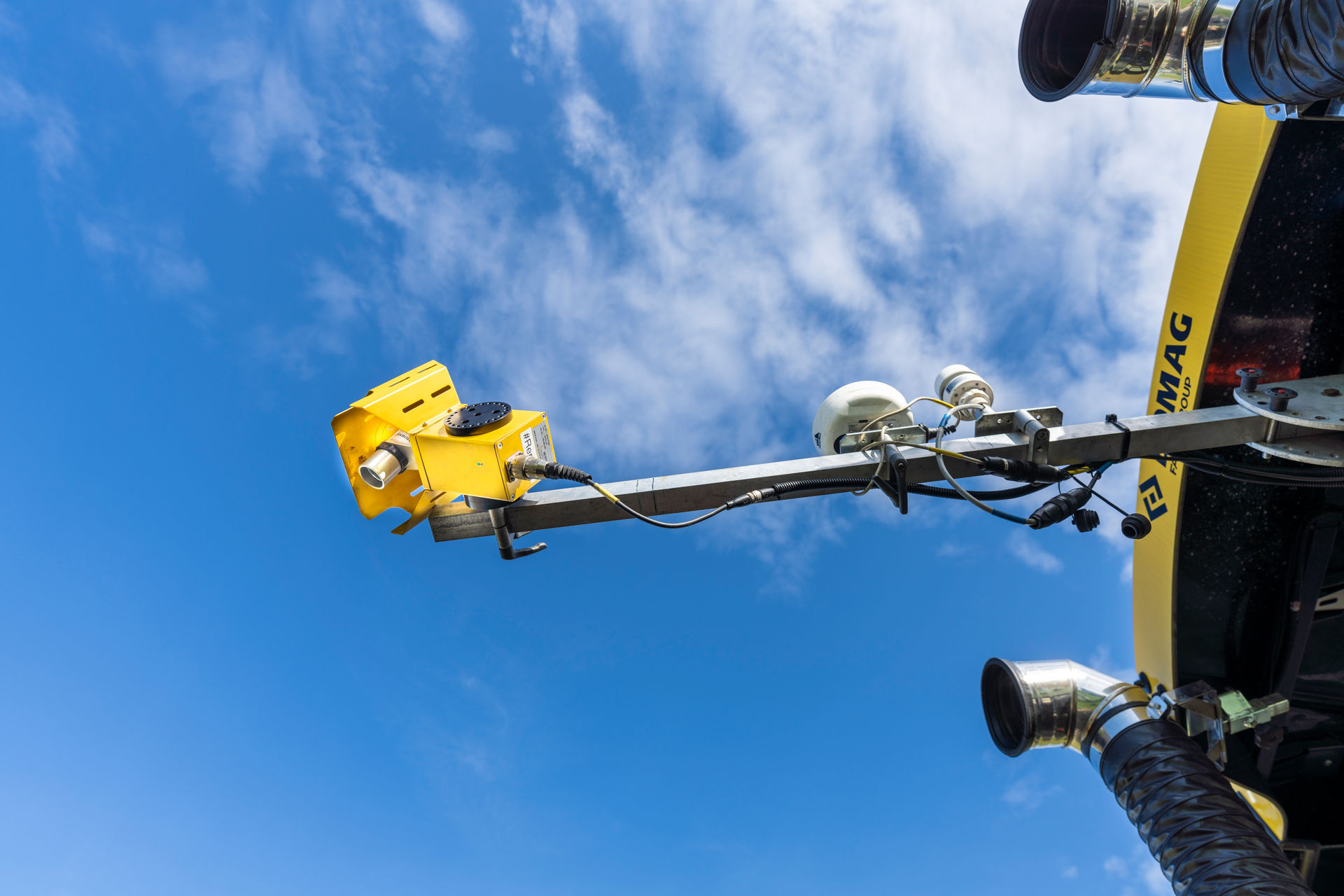
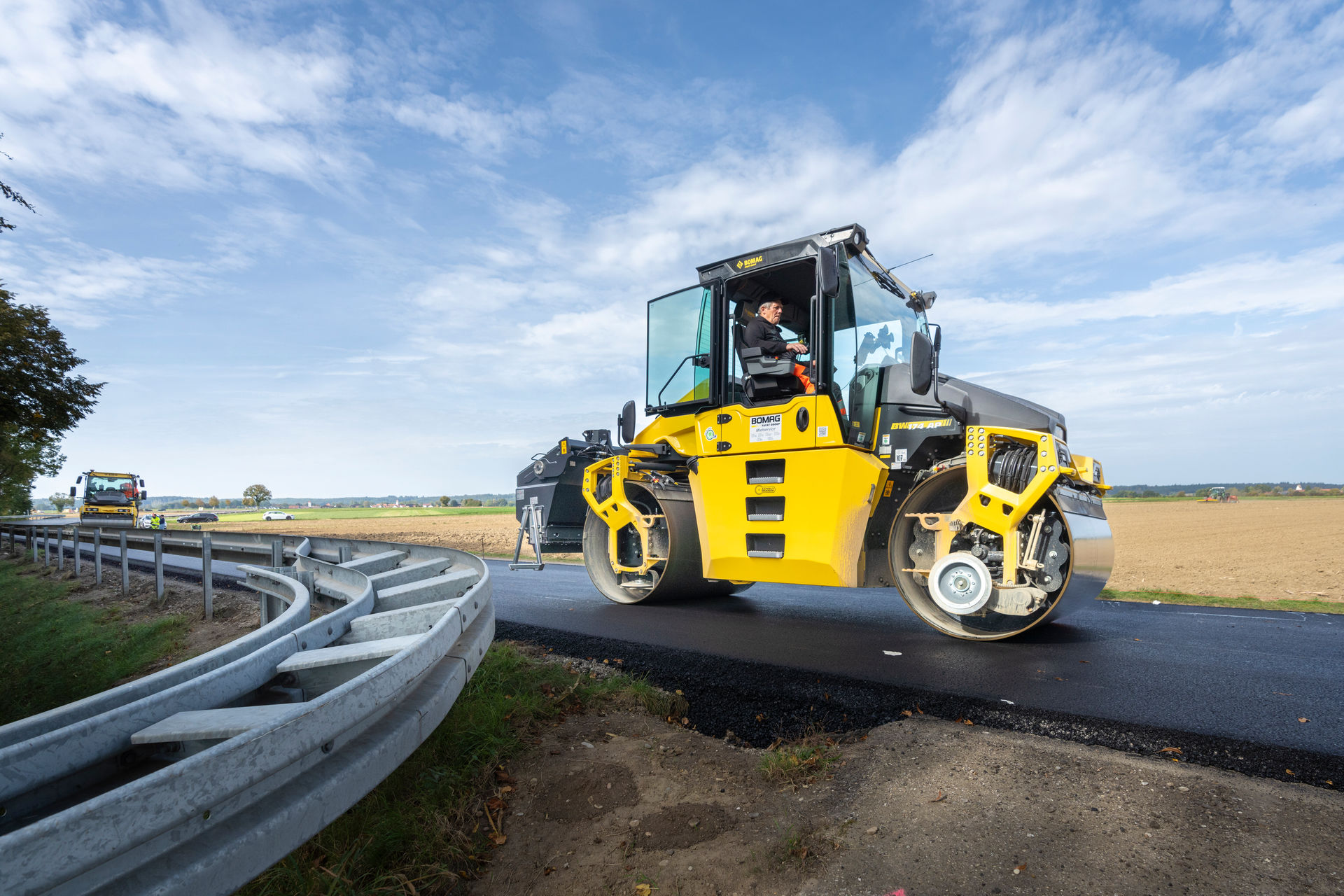
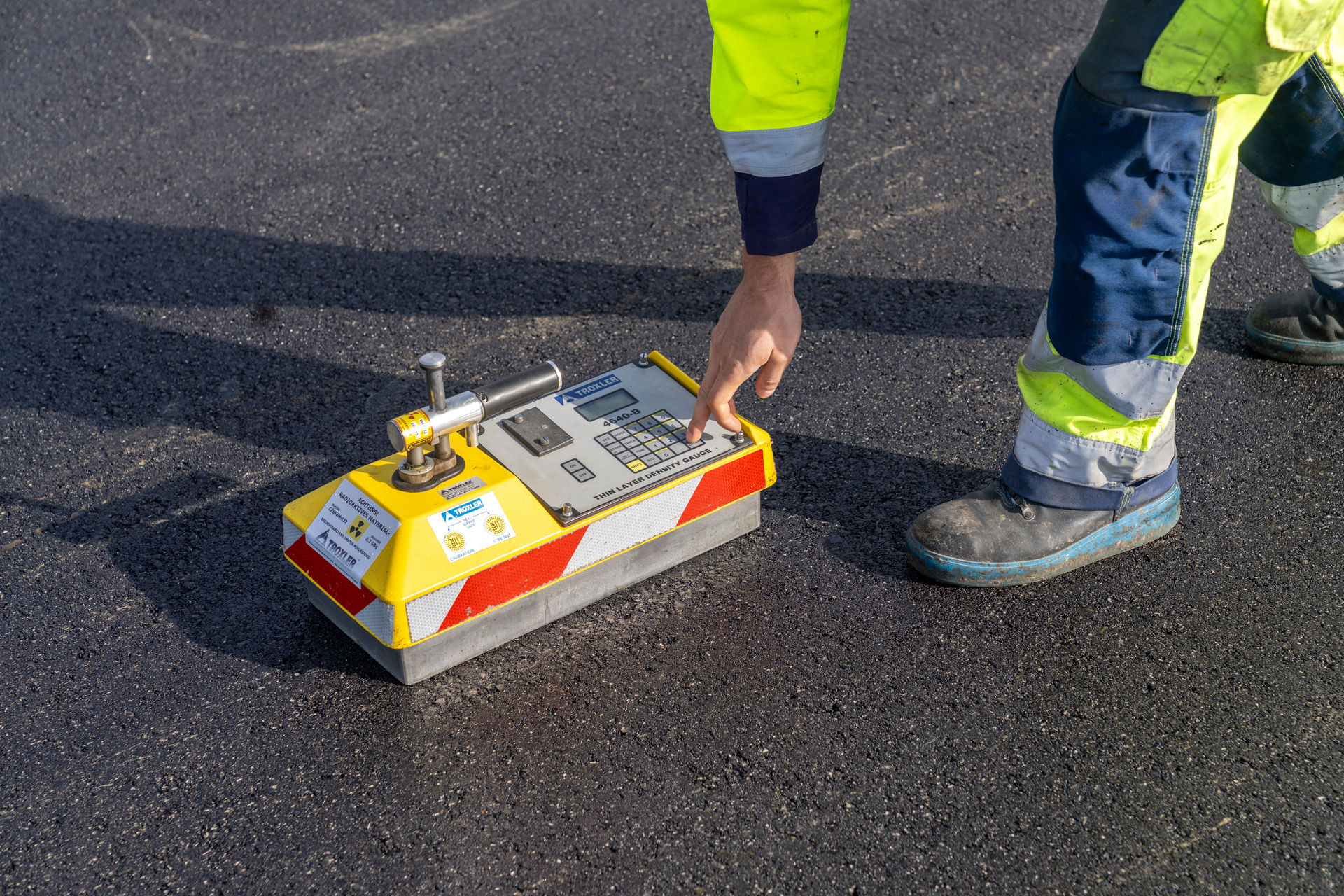
For the final roller compaction and the obligatory spreading of chip and seal (in this case, gala chips 1/3, bituminised) on federal roads, the Lutzenberger team used three BOMAG tandem rollers: a BW 174 AP-4 AM, a BW 154 AP-4 AM and a BW 174 AP-5 AM specially provided for this job.
BOMAP was installed on all rollers. With BOMAP, the easy-to-install solution for surface covering dynamic compaction control (CCC), the compaction success was immediately visible at all points. The compaction target was reached after six passes, and the area displayed on the tablet turned blue.
For roller operators, BOMAP is the perfect navigation system, saving up to 20% of passes. In the process, BOMAP not only visualises the compaction progress based on the passes of all rollers involved in the compaction process but also displays the asphalt temperature measured by each roller during the pass.
Also installed in every roller: ASPHALT MANAGER. The Lutzenberger roller operators only needed to select the layer to be compacted (in this case, the surface course), and the roller took care of the rest.
With ASPHALT MANAGER on tandem rollers, the amplitude adapts to the compaction already achieved at all times, minimising the risk of over-compaction due to aggregate crushing. Only the number of passes that are really necessary have to be made. The result: rapid achievement of the compaction target. Continuous monitoring of compaction progress with ASPHALT MANAGER ensures consistently high compaction quality.
When the compaction window is particularly tight, we rely on BOMAG’s intelligent compaction technology. Using the Troxler probe, we measured values up to 98.9% after just six passes. Daniel Lauer, Site Manager, Xaver Lutzenberger GmbH & Co. KG
When it comes to paving and compacting warm mix asphalt, BOMAG machines and digital innovations really come into their own. This is where the following technologies developed by BOMAG can be used to their best advantage: ASPHALT PRO prevents downtime and optimally interlinks process workflows. FLEXMIX minimises thermal and physical demixing of the paving material. MAGMALIFE ensures homogeneous and rapid heating of the screed and a perfect surface. ASPHALT MANAGER and BOMAP are used to achieve final asphalt compaction as quickly and easily as possible – solutions that are already in use on many construction sites worldwide and have also proven themselves in combination when paving warm mix asphalt.